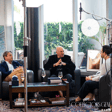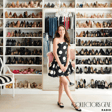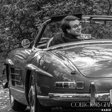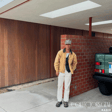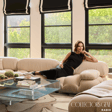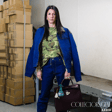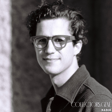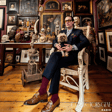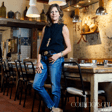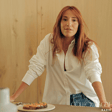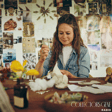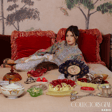Introduction and Podcast Invitation
00:00:00
Speaker
Designing with complete abandon, with an unlimited amount of money is a huge privilege. But actually, when you have a budget, sometimes you can weirdly be sort of more creative because you do have to sort of think think a little harder because it's just not so easy you know it's like cooking with something with the limited ingredients you know you've got to make it taste as good as it can but you only have a very limited ingredient you have to you have to apply yourself in a different way what's going on everybody and welcome to collector's gene radio
00:00:38
Speaker
This is all about diving into the nuances of collecting and ultimately finding out whether or not our guests have what we like to call the collector's gene.
Meet Steven Rodell, Creative Director
00:00:47
Speaker
If you have the time, please subscribe and leave a review. It truly helps.
00:00:51
Speaker
Thanks a bunch for listening and please enjoy today's guest on collector's gene radio.
00:00:58
Speaker
Today on collector's gene radio, I'm joined by Steven Rodell, the creative director at Guy Goodfellow, a studio shaped by the namesake Singular Vision over 25 years. Steven works closely with Guy and that legacy, helping bring to life interiors that thread errors together with grace, intuition, and a rare kind of spatial intelligence.
00:01:15
Speaker
The studio's work doesn't shout, it unfolds, and draws you in slowly to rooms built on quiet conviction. We explore the idea of design as a form of collecting. Steven speaks to the delicate choreography behind layering decades, balancing restraint with richness, and knowing when a single object should lead and when it should take a step back.
00:01:35
Speaker
there's a certain kind of magic in the studio's work. It doesn't rely on spectacle. Instead, it reveals itself slowly through the tensions of textures, the conversation between eras, and the placement of one well-loved object beside another.
Influences and Early Inspirations in Design
00:01:48
Speaker
In many ways, Stephen's role is less about decoration and more about composition, an ongoing act of collecting, editing, and storytelling. So without further ado, this is Stephen Rodell for Collectors Gene Radio.
00:02:04
Speaker
Stephen, welcome to Collectors Dream Radio. Thank you very much for having me. Thank you. It's my pleasure. Working alongside Guy, the orchestrator of the magic that goes on at Guy Goodfellow, you now play a pivotal role at the practice.
Balancing Client Needs with Design Integrity
00:02:17
Speaker
And I'd love to know what drew you into this world of richly layered interiors, especially being based in the UK. I mean, where did this all begin for you?
00:02:25
Speaker
I think it all began with my great aunt, really. She was or is you know of a wonderful woman, um a big ah big sort of influence in my life. She was in the sort jewellery trade um you know for for many decades. She's sort of long retired now and she was a jeweller.
00:02:46
Speaker
And then she had a small gallery in in Somerset and she started with jewellery then went to deal in sort of decorative arts and I think she was a person that I would go to visit when I was younger for sort of weekends and school holidays and um and of course Saturdays were always spent in and the shop, in the gallery and you know, that was the place whereby I really started to look at objects, decorative arts, jewellery, and really try to sort of understand them and appreciate them.
00:03:27
Speaker
And she also had this wonderful house that obviously I'd stay at and it was sort of quite different from the house that I grew up in because it was so richly layered and it was so eccentric and it was sort of like theatre. I mean, she was also in the theatre from a sort of lighting perspective. So it was always a place that was filled with interesting objects, people, lighting, and that really was where I guess my my interest was piqued.
00:03:57
Speaker
And through her sort of you know encouragement and nurturing, it sort of spiraled from there. Amazing. And you go on to have an incredibly rich and varied design career, seeing and working on wonderful properties all over the world.
00:04:10
Speaker
And you're now Creative Director at Guy Goodfellow. What was that transition like? Well, I think that there actually isn't a fundamental difference. I mean, the difference is that we have people that come in and they pay for our services.
00:04:23
Speaker
and you're working on a diverse portfolio of projects. And it's sort of the same thing with what I did before, and you're just working for one family. But really what you're doing is you're trying to translate their character.
00:04:36
Speaker
You're trying to create something that, as I recently read or heard something in ah in a podcast, they described interior design as being like sort of self-portraiture.
00:04:48
Speaker
And you know you're creating portraits.
The Role of Collecting in Design
00:04:50
Speaker
that are demonstrating or reflective of the people that live in them. I would love to know from you, you know, you saw so much growing up with your family kind of being in this design and antique space and you kind of stuck along that path really your whole life.
00:05:10
Speaker
What were you interested in and what were you collecting a long time ago and how has that evolved into what you're collecting now? Because, you know, the more you see, the more your ears perk up and and the more interest you get in things that are, you know,
00:05:25
Speaker
Sometimes they're more rare. Sometimes they're just more sophisticated. Sometimes your taste just changes. I mean, I think i knew... From you know very early on, I mean, probably sort of 12 or 13, I would sort of say I wanted to be an interior designer.
00:05:39
Speaker
And, you know, i I remember when I was at school and you have to go on this sort of career, go to the careers council or something, and you talk about what you're going to do at university. And I said, well, I i think I want to go and do an interior design course. And everybody's sort of, nobody was particularly durturing about that.
00:05:55
Speaker
And so, you know, I actually I went to study art history, architectural history and design. um And that seemed like ah a good way, a sort of good compromise. You know, it felt that it was it was academic and that if I wanted to do something in design after it, well, that would give you a good sort of academic foundation.
00:06:14
Speaker
I think what interested me were rooms, were homes, were buildings that were telling stories. They were sort of narratives for someone, something.
00:06:26
Speaker
And I think, you know, the richer they were, the more layered they were, the more sort of eccentric, that that sort of interested me. They had to feel like they had evolved. They had to feel like they had genuinely been created over over a period of time.
00:06:44
Speaker
Certainly. And I think that that speaks to so much about what Guy Goodfellow is all about. it's It's the layers. And you know Guy often speaks about this, right? it's It's about mixing the best of every decade, right? and And you as a creative director, how do you maintain that balance ensuring that each space feels so timeless rather than referential and and sophisticated, I would say, rather than styled, right?
00:07:10
Speaker
Yeah, I mean, we joked yesterday that in ah in a client presentation that, you know, the client sort of suggested something and Guy said, oh, no, but if we put that in there, then one might think that you your interior designer had just left.
00:07:26
Speaker
So how do we temper it? I mean, i think instinct is so important. I mean, instinctively, I know if something's going to work or if it doesn't. I mean, I'm just finishing a project at the moment with a huge list of sort of items to procure. And i think we're about three weeks away from finishing, which seems quite daunting.
00:07:45
Speaker
But actually, it doesn't matter because all of those items that aren't prepared yet are will be antiques. And I can sit there for hours and then suddenly I'll find something that I just, I instantly know that that's going to work for that space. You know, it's the right sort of composition, shape, form, design.
00:08:01
Speaker
um It's just going to sort of feel like it's always the supposed to have been there. Certainly. And I think I would love for you to explain to the listeners, because I think this is something that people who aren't in the interior design world or design world in general, I think this is something that they may not understand is that you guys are constantly on the hunt collecting for things because you have projects that lust for these types of items. And it might not work for the current project, but it could be a project four years down the road
00:08:33
Speaker
And you're going to go into your your studio or your warehouse or wherever you keep these items. And you're going to say, oh, my gosh, I'm so happy I bought this thing or this this commode because it fits absolutely perfect. So explain to the listeners what it's like to just constantly be on the hunt for items, even if you don't necessarily have a place for them yet.
00:08:52
Speaker
I spend my life down these sort of rabbit holes on, you know, auctionette, on specific auction sort of websites, on the, you know, the sale room dealer websites,
00:09:06
Speaker
i mean, when I go to bed at night, most people either watch television or read. And I sort of lie in bed scrolling through, you know, looking at whatever's piquing my interest on that particular day.
00:09:16
Speaker
You know, yesterday was sort of black and Dutch mirrors. um I mean, and sometimes, you know, after page, know, 29 something of... pairs of chairs of the 1940s, you actually sort of think, God, that's it. I can't i can't do anymore. i've got to turn over and go to bed. I mean, it's just an insatiable thirst for sort of ah just but just finding things.
00:09:39
Speaker
And, you know, finding things and being inspired by things. and And sometimes you don't even buy them. You just, you know, you you park it as a reference point. You find a great pair of stools and you think, well, i I have no place for those now, but I sort of, you know, put it little folder and i'll I'll come back to
Homes as Personal Collections
00:09:55
Speaker
it. And You know, and and one day I'll either hope to find it or maybe I'll have to, ah you know, recreate it or be inspired by it.
00:10:06
Speaker
um i just I'm always and guys the same. and We're just always on the look for something. I mean, if I wasn't an interior designer, I probably would be a dealer. But the problem is I wouldn't really want to give anything up.
00:10:20
Speaker
I'm with you there. I think that that's always the problem is you find all these amazing pieces and you have the benefit of being in the UK and having access to what I would consider the best of the best is in in the UK and Europe.
00:10:32
Speaker
And it's not that difficult to get pieces. For me, every time I see an amazing piece of furniture and I see either the ah the pound symbol or the the Euro symbol, I have to pass because getting it shipped to the US is just a whole other issue. But it's always a problem for me.
00:10:47
Speaker
I'd love to talk about ah practice or a belief that you and Guy have at the firm, and that's that a home should feel like a personal collection built over time, right? You and Guy often speak of of this layering of decades that I mentioned, textures and pieces from vastly different eras.
00:11:06
Speaker
Is your role, would you say, more akin to that of a collector than a decorator? Because you're almost, like you said, you're shopping constantly and you're constantly editing and and shaping this this deeply personal anthology of objects and and influence.
00:11:21
Speaker
Well, I've often thought maybe it was about sort of without sounding pretentious, but maybe it's a sort of role of a curator. And interestingly, you know, when I did my undergraduate art history, for a moment I sort of thought, I'll i'll become a curator, that's what I'll go and do, I'll go and work in a gallery and I i won't do interiors. And then as as time went by and I ended up in London and I ended up not doing a master's in museum and gallery studies for various reasons,
00:11:49
Speaker
primarily because I just fell into the world of design, I sort of felt that actually and wasn't so different to sort of being ah curator because you were you you are curating collections, you are putting things together, you are selecting. It's a curator and editor, it's one of the same, i'm not sure, but they sort of imply the same thing.
00:12:09
Speaker
You know, something that i always ask off air, and I don't know why I never ask it on air. Maybe I haven't, I'm just not remembering. But can you take the listeners behind the curtain a little bit and explain to them, you know, when you're doing a project, right? Each project is different. There's a budget. Sometimes there's not a budget.
00:12:26
Speaker
But you want to make it, you want to fill the space with really incredible pieces. And a lot of times that comes with having to spend a little bit of money and, and you know, up your budget a little bit.
00:12:38
Speaker
What would you say the difference is like between working with someone with no budget when it comes to sourcing antiques and furniture and all that stuff versus someone with a little bit of a tighter budget and you really have to
Guiding Clients in Taste Discovery
00:12:50
Speaker
go out there and find the best that you can for the money?
00:12:53
Speaker
Well, I think sometimes, ah um I mean, I think interior designers at a certain level do become a bit blasé and you sort of bound about these these um values or figures on things. And we all come a bit, we become a little desensitized, especially when you're sort of doing it for yourself. I mean my partner and I have just finished renovating our flat in London and, you know, some of the things that i was putting forward and he kept on reminding me that and we didn't have my clients' budgets.
00:13:18
Speaker
um and you do become a little desensitized to it. I think that actually designing with complete abandon, with an unlimited amount of money is a huge privilege.
00:13:31
Speaker
It's also a big responsibility. And I've been so lucky and I'm so grateful to <unk> have worked on these projects. But actually, when you have a budget, sometimes you can weirdly be sort of more creative because you do have to sort of think think a little harder because it's just not so easy. You know, it's like cooking with something with the limited and ingredient.
00:13:55
Speaker
You know, you've got to make it taste as good as it can, but you only have a very limited ingredient. You have to you have to apply yourself in a different way. How do you determine when you know, a collection, whether it's with a grouping of antiques or it's a piece of furniture or it's a commode, how do you determine when an object or a group of objects should lead a room? And when do you decide when they should just quietly support it, right? Is there a rule of restraint or is it kind of more intuitive?
00:14:25
Speaker
I think it's quite intuitive. I think he, I think he just sort of No, i mean, I think there's there's that whole this that saying of putting on too much jewellery and then you sort of take something off as you leave leave the house.
00:14:40
Speaker
um And you know sometimes I recently worked on a project with a great collection of beautiful French furniture and the client sort of wanted everything you know everything that she had sort of amassed for years with this apartment in London in mind.
00:14:57
Speaker
And we we settled on No matter how many times we did the floor plans, we sort couldn't quite get it all in. And in the end, we sort of had it all delivered. And it was like taking off a brooch at the end. You know, it was sort of the room. don't know. It was like a ah sort of reverse selection process, if that makes any sort of sense.
00:15:16
Speaker
Certainly. i mean, I think in rooms you have you have your anchors. You know, you have a great painting. You have a great commode. You have... um I think it's, you know you you know, a beautiful dining table. um i think those days are often those really noticeable pieces that sort of they sit to command attention.
00:15:38
Speaker
And then i guess it's then putting in the the things in the background that but layer it, that make it feel um evolved over time.
00:15:51
Speaker
love that. I would have to imagine that you work with some clients that know exactly what they like to collect. In fact, maybe they, like you said, they've already got a head start and have a whole collection of French furniture
Cultural Influences in Design - UK Context
00:16:01
Speaker
and other clients are really lost.
00:16:04
Speaker
They don't know what they like. They don't know what they want to collect. They don't know what they want an object to really look like in their home. How do you help the clients that truly want to collect, but don't know how to kind of uncover that and, and make their space?
00:16:19
Speaker
Well, I think it's up to us to sort of try and shepherd them in the right direction. I mean, I think when people come come to Guy and they come here and they come to Langton Street, which is a really special place, it is a home, you know, it it is a house, it is the design studio, it's the collection, it's also Guy's London house.
00:16:39
Speaker
um And you get you get a real sense of what we can create, you know, what what we enjoy. um And I think for those clients that are perhaps a little more not as defined in terms of what they want or perhaps they don't know yet, coming here really sort of distills it for them because they see firsthand what they can have because they come to us because they enjoy they enjoy the style, they enjoy that sort of particular aesthetic.
00:17:16
Speaker
They kind of look up to you guys to to assist them and and kind of guide them through the process of, you know, not necessarily what's the most rare, but what makes a collection great or what makes an item within a collection stand out in a room?
00:17:31
Speaker
I think so. I mean, seldomly do we have people that come and don't know what they want. I mean, even if they say at the beginning they don't what, Generally, if you ask the right questions and you try to understand them and you try to, again, it goes back to this idea of trying to create an interior that is truly reflective of the people that live in it.
00:17:53
Speaker
So it reflects their interest, their personality, their character. It's about trying to sort of tease that out.
Designing Evolving Spaces
00:18:02
Speaker
And if you ask those questions and you get to know those people in a very legitimate, in a very real way,
00:18:08
Speaker
then the interiors then sort of form around it. Right. Like types of questions like what matters to you? Do you, do you host a lot? Are you, you know, having family over often? Where's your favorite place to usually relax in the home? Right.
00:18:23
Speaker
Yeah, exactly. You know, how do you entertain? You know, do you do you want a kitchen that has a table in it? Do you want a separate dining room? You know, do you want, you know, open plan living? There are just so many questions, so many probing questions that that bring out quite a distilled sense of grief by the end of it.
00:18:42
Speaker
Being based in the UK, you're obviously heavily influenced by your surroundings, right? You you have these old Georgian homes and and Edwardian homes and and all these amazing details that you know are really specific to England.
00:18:59
Speaker
What other parts around the world really inspire you and Guy in terms of of design? I mean, sometimes, like you said, you get desensitized to everything else because you're seeing so much of the same thing.
00:19:13
Speaker
Not that architecture isn't incredible in the UK, but there's a lot else to be seen. So i'd I'd love to know where else you guys draw inspiration from in terms of places. Would you say, you know, Milan has such, you know, distinct design and and Paris is so different from Provence? You know, what are what are the different, I guess, places across the world that that inspire you and Guy to design homes and design interiors? Or are you strictly solely focused on England heritage?
00:19:44
Speaker
No, I don't think so. i mean, I've worked a lot internationally over the years and I think, and as has Guy, um I think a lot of our projects currently are in the UK and we're working on lots of very interesting things here.
00:19:58
Speaker
I guess with any type of travel, you you know you're slightly intoxicated and you come back and you... then you think about that. And I mean, for example, last year I was in South Africa in Mozambique and I remember staying at this lodge with these amazing sort of, you know, it matted woven reeds.
00:20:17
Speaker
And you would sort of walk a pad around this this lodge with these amazing rugs made out of these sort of natural fibres. And I remember... You know, we then went to find where they were being made and we went and I came back to London with all of these, some with all these samples and guys said, well, what is that for?
00:20:35
Speaker
And I said, well, I mean, I was just so interested. it I mean, he said, yeah, but where are you ever going to use it? I said, well, I guess we'll have to have, you know, sort of snag a lodge project in sort of Mozambique or South Africa or something, because it was only really relevant to there. Like you couldn't, you wouldn't have used it here.
00:20:52
Speaker
So I guess about wherever you're traveling. It's about being inspired by that place and and sort of thinking and having that in your in your sort of library of ideas when you might just end up working there.
00:21:07
Speaker
In your view, what do you think distinguishes ah beautiful room from a collected room? Because it's easy to walk into a room and say, yes, it's just beautiful, great lighting, nice furniture, um you know good design, you know nice original moldings.
00:21:21
Speaker
But there's a difference between that and a room that feels collected. So I always think a room that is well, that has evolved over time, that is collected,
00:21:34
Speaker
there will be elements in that room that look slightly like they don't belong.
Personal Collection Preferences
00:21:41
Speaker
So they're the thing that has, you know, they're the chair that wasn't designed for the room.
00:21:46
Speaker
but it's been bought in because the other chair's no longer there. It wasn't comfortable. Something else has been bought in. it means the fabric on it is slightly off with the scheme.
00:21:56
Speaker
i guess there might be a slight discrepancy in scale. i mean, if you think about great rooms that have sort of been well collected, there is a genuine sense of patina.
00:22:08
Speaker
Whereas in beautiful rooms that were sort of designed yesterday, they can be beautiful. They're beautiful in their own merit, but they don't, they don't interest me in the same way that rooms that have legitimately evolved over time do. you I think that goes back to, you know, when I was younger and I was a sort of volunteer at the National Trust and I, that's really where I,
00:22:33
Speaker
where I take a lot of my inspiration from ah those, I think about those great rooms and those great houses and how they were put together and how they became a melting pot for, you know, one generation's ideas or, you know, interests or, you know, new nuances. um There's something about them that just feels legitimate, whereas sometimes beauty in rooms can feel slightly constructive.
00:22:58
Speaker
So let's talk a little bit about your personal collection and the things that you love to collect or the things that interest you, whether in your home or your studio or your mind.
00:23:09
Speaker
You know, what object or even material speaks most to your creative soul right now? So first of all, i've I've learned to not sort of discriminate, if you like. I mean, I sort of, I think for a while I was to sort of so tuned into an idea of what what I should be looking at and, well, I had fixed sort of fixed ideas and things. And I think that anything that I love, like anything that I talked earlier about, this feeling of instinct, I know when I want something, I know when I love something because
00:23:40
Speaker
I just know it. It just sits so well with me. So the moment I fear when the moment like feel that towards an object, um a piece of furniture, whatever it might be, i try, i really, really try obtain obtain it um And actually, Philippe, my partner, and I have a have a sort of deal whereby he says that before we know we got together, would sort of just buy anything that kind of interested me.
00:24:08
Speaker
But now we really have a deal whereby we only buy if we are we have a universal agreement on it. And we are very in tandem. So that makes it quite easy. But I mean, what do I love? What do we love? I mean...
00:24:20
Speaker
I love portraiture. So, know, when I look at portraiture, and we have a few pieces that really interest me. I look at it, I look at the sitter, I think about the story, I think about the narrative, I think about why why but why that person? you know I have this wonderful painting of a sort of, I guess he's about 1920s by what he's wearing.
00:24:43
Speaker
And I look at that painting all the time. I mean, first of all, it's the painting that I absolutely wanted. I mean, I saw it at this small dealer that we we buy from, and I saw it on a sort of Sunday morning, and it was just too far out of my price range at the time.
00:24:59
Speaker
and um And it just, I kept on thinking about him constantly for that week. And I said, if we go to Cecile on Sunday and he's still there, I don't know how I'm going to pay for it, but I'm going to buy that painting.
00:25:13
Speaker
And so we went and the painting was gone. Oh, no. And andnna I really, I ah use that as the lesson to sort of try and not let things go.
00:25:24
Speaker
Six months later at Christmas, Philippe gave me the painting for Christmas, which was extraordinary. Unbelievable. But I think I've sort of digressed from your your original um question, which was what do I love to collect? These sort of portrait drawings. um I mean, I love lighting.
00:25:42
Speaker
I mean, I never really use... sort of modern contemporary lighting in anything. I would always try to source vintage or antique pieces. Yeah. Finding good vintage lighting is really difficult, but when you find the right pieces, they are night and day better than anything modern.
00:26:00
Speaker
Absolutely. they just they They just stand out and they just they just make a room. I mean, I've got beautiful lights that I've, you know, sort of tirelessly sort of tried to find. I've got more than I need, but I...
00:26:15
Speaker
I love lighting. i mean, I think it's so, so important. I love to collect seascapes, a particular interest in anything seascape. And I don't know really where that comes from. I think it's just this, this,
00:26:30
Speaker
idea of narrative and transport, like transportation again, sort of transporting you to somewhere inside of a inside of a painting, which I don't get, for example, when I look at sort of non-frigurative sort of abstract pieces. So I guess what I'm always really interested in is the narrative in what something's trying to represent.
00:26:51
Speaker
Certainly. I've been super into portraiture lately too and collecting pieces where I can. And I bought a piece the other day. I'm waiting for it to come in and it's about five feet tall.
00:27:04
Speaker
And I don't know where it's going to go. I'm a little nervous for when it arrives for what my wife's going to say. what what you know What mirror do we have to take down to put this thing up yeah But I'm um very excited. and And I think that there's...
00:27:21
Speaker
you know With portraiture, not one piece is the same, and it could be the same person painted 10 times over, right or the same subject painted 10 times over, and it won't be the same. and I think that that's the best part about it. um and I think the the world has shifted from portraiture being this eerie, creepy thing to being really elegant and classy.
00:27:43
Speaker
It's just beautiful. It's, you know, I mean, a friend of mine jokes that she's like, I, you know, at the weekend, she said, oh, I saw your Instagram post the other day, another sort of, you know, another portrait, you know, you've been to another Jacobean house and the only thing you focused on is is a portrait in there.
00:28:00
Speaker
It's the thing that I really, really enjoy the most. Yeah. And I i think the the interesting the other interesting thing about portraiture is, you know, sometimes the background is really dark and even the subject is is a little bit muted and it's got this very moody look. Sometimes it's it's a little bit more vibrant, but you can put all of them in a room and they all look good together.
00:28:22
Speaker
Agreed. Yeah. I'd love to know, you know, in the UK, you get to see all these amazing manners and and what a lot of people, for lack of a better term, maybe in the US would call castles, right? But they're really these these massive manners. And when you walk inside of them, or at least when you see photos of them, the furniture and the art, it's all very, I guess, period correct.
00:28:46
Speaker
And You don't often see someone taking a space like that and really layering it with a mix of different furniture. How do you feel about these massive manor homes and, you know, should should all the furniture in the RP period correct? Or do you find that there's some beauty in kind of mixing it up?
00:29:05
Speaker
No, I think there's real beauty in mixing it up. I'm not a purist in that respect. I mean, I think period correct when it comes to architecture. So, you know, when Guy and I look at a project, I mean, foremost, he's ah he's an architect. So we look at any project that we're working on and we always want to sort of,
00:29:25
Speaker
get the architecture right from the beginning.
Digital Tools in Collecting
00:29:28
Speaker
And some projects we, I mean, most projects we have that luxury of doing, some um it's it's it's preset, you know, we're coming in too late, but it's about sort of building the bones. And once that's together, then the interiors sort of, in a way, all sort of fall in around it.
00:29:46
Speaker
But I think, you know, recently I was reading an article about, and I think it was in World of Interiors, um of Haddon Hall, which is a beautiful sort of spectacular house in the north of England.
00:29:58
Speaker
And that's a really good example about how the current custodian has, you know, has this extraordinary collection of, you know, early furniture, and they've been putting in very contemporary pieces.
00:30:14
Speaker
And I think that you know, if done sympathetically, if done correctly, it makes for a very, very interesting space. So again, it goes back to what Guy was saying before about, which is is a great sort of term about, you know, every decade, there's the best of every decade. And when you really think about that, it's distilling down what that is.
00:30:40
Speaker
And it all sort of seems to work together. Are there a lot of good restoration folks still left in the UK, you know, who can come in and and really, you know, make sure that these these historical homes are kept up to snuff, but while, you know, remaining all these original details and stuff? Because I feel like it's in the US a very dying practice.
00:31:02
Speaker
Yeah, no, I mean, here, and we're very lucky because we have a ah great stable of craftsmen, craftspeople, restorers, guilders.
00:31:13
Speaker
I don't ever feel sort of short of anybody to sort of go to. mean, we're very, very lucky to have and to to work with with all the with all these people.
00:31:25
Speaker
I don't think there's a sort of a short supply. yeah I love that because, you know, There's not nearly as many historical homes and properties in the U.S. as there are probably.
00:31:39
Speaker
I think probably even just the Cotswolds has more than the whole U.S. does. And, you know, to to keep the integrity of those is has got to be crazy upkeep. But to know that there's people out there that are happy to do it and and still want to ah learn the trick of the trade, if you will, to to do that is special.
00:31:58
Speaker
I want to talk about, you know, we're in this digital world of, of everything, right? Everything is online, everything's on the internet and, and it's great for us, right? We can, we can buy something within a minute and it shows up the next day or, you know, for your and I's purposes, it's much easier to scour auction catalogs online than it is from reading a pamphlet or a newspaper.
00:32:20
Speaker
But I still find that collecting, whether it's digital or not, is one of the last practices that insists on this patience and and discernment and memory and, You know, I'd love to know from you because you're constantly looking at this stuff as am i where do you see collecting in the contemporary life kind of still holding power?
00:32:41
Speaker
You know, do you see the the the role of collecting remaining this this patience and discernment that you need um as as time evolves, right? Because even if you have... all the money in the world, right? Collecting the right piece, you really have to wait for it to come to market.
00:32:56
Speaker
It's not about just buying ah an expensive car from a dealership when you can get it the same day, right? If you have all the money in the world. But when you want to collect something truly rare or truly exceptional, you really have to wait for the right one to pop up. So no matter how digital the world is and how fast the internet is, you still have to have this really exquisite patience.
00:33:17
Speaker
The patience to it. I mean, I guess that's the double-edged sword, isn't isn't it? I mean, it's like, you know, we we talk about in interior design, you know, how how now...
00:33:28
Speaker
everything's online so actually nothing you know everything is identifiable but you look at something like google image search i mean that that's transformed things because often when i found i mean yesterday i was looking at some some beautiful sort of 1950s lights and the dealer had sold them so i immediately said to um my colleague just put it into google image search and see what comes up and of course she put it in and and and we found another pair of those lights somewhere else.
00:34:00
Speaker
Now, I wouldn't have known where to go to find them, but we actually have that pair. I mean, that's that's slightly different, but I mean, you know, that that's a great tool for us. So I think in a way, you know if you have an appetite to find something, maybe you can find it much quicker.
00:34:15
Speaker
i mean, I love the whole just meandering sort of, you know, process of it all.
Designing Around Beloved Objects
00:34:21
Speaker
And sometimes, i mean, I might have a list of what I'm looking for, but You know, I'm not looking for a particular style of commode or a particular style of chair. I'm just looking for something that, again, instinctively, I think when I see it, I'll know it's going to work in the room.
00:34:38
Speaker
Each project that you touch kind of becomes this this portrait, right? It's it's of a a portrait of a place or a moment, a sensibility. Do you ever think of your work as maybe collecting stories and moments more than physical things?
00:34:55
Speaker
Yeah, I think that's interesting. um i always love, whenever I'm away on holiday somewhere, I love to bring something back. So for example, I was in Paris a couple of weeks at the beginning of the year and i i was in this beautiful little shop and they had this exquisite little tall 1930s lamp.
00:35:18
Speaker
And actually, the act of, A, it was beautiful, but the act of buying it when I was there on that day and knowing that when it goes into my kitchen, I'm going to enjoy it and remember that time.
00:35:32
Speaker
It's like the association with buying something. I'll really, really enjoy. Like I remember that day in Paris. I love that. Yeah, I often try and collect with with that intention too, right? Trying to make make a moment out of it.
00:35:46
Speaker
As great as the object is, right? Once you bring it home and you get to live with it, that's the day-to-day beauty of that. But it's it's remembering where you found it, if you negotiated. Yeah, how hard do you haggled.
00:35:58
Speaker
ah Yeah, exactly. But I guess you're the only keeper of those memories. So in a way, it doesn't really... so for other people... they don't really, I guess they don't enjoy that narrative in the same way unless you tell the story.
00:36:13
Speaker
Yeah. I love when someone comes to the house and they're like, what is this? And I'm like, okay, let me tell you why this is great. You know? Yeah. All right. I'd love to know before we wrap it up with the collector's dream rundown, you know, if you could design a room around a single object from your own life, from your own collection, whether it's a portrait, a lamp, a chair, a piece of fabric, whatever it may be, what would what would that item be?
00:36:41
Speaker
And what do you think the space would say about you? I mean, interestingly, you know, I've, as I mentioned earlier, I've just sort of renovated part of our flat that we've been living in for about four years, which I always sort of say is the sort one of the smallest flats in South East London.
00:36:57
Speaker
And people come and they say, I mean, a friend of mine turned up last year with a broken leg and he, after about three days said, for God's sake, Stephen, every, every, everywhere I look, I feel like I'm going to sort of knock something off the wall or crash past something.
00:37:12
Speaker
um What have I done? i mean, all the pieces that we've included back in the flat, I love, like I've, you know, I've been, I've really sort of edited it down.
00:37:22
Speaker
So if I think about things, I mentioned the Potter earlier, the portrait, you know, I just put him in a much more sort of important position. You know, I wanted to sit there at my dining table and enjoy him when I sit on the little bonquette.
00:37:37
Speaker
He's on a sort of corner in a corner with a beautiful picture light above it. And it kind of gives him real presence. And then, you know, weirdly to the to the left of the bonkett is this beautiful portrait of a French bulldog called Shaver, which is by the Victorian artist called Herbert Dixie. And he is this absolute spitting image of my dog.
00:37:57
Speaker
And I bought him. He was Herbert Dixie's dog in, I think, like 1896 or something. And I bought him because of the similarity. um But again, I have...
00:38:08
Speaker
I have sort of built the room around those around those two sort of portraits. You know, if I go through into our sitting room, there's an amazing sort of four watercolours by the British sort of contemporary artist, Lucinda Akes.
00:38:24
Speaker
He does these sort of Chinese junk boats which I'm slightly obsession obsessed by. I've sort of had many and drawings and paintings of junk boats. I think it's just this sort of curiosity and of Asia.
00:38:39
Speaker
And again, i've I've sort of, I really have built the room around around that those four pictures and they're big so they they sit rather impressively on this wall and you The colors are quite vibrant, but I've sort of, the walls are, I think it's called a Mortlake Brown.
00:38:58
Speaker
So it's quite cocooning. Yeah. yeah Does that sort to answer your question?
Evolving Collections and Gifting
00:39:03
Speaker
I'm not sure that's a very. Yeah, no, I think you answered that the way I was hoping you would. And that's that it's nearly impossible to pick a favorite item. And I think that that's what, what this whole conversation is really about. It's about,
00:39:17
Speaker
editing your space down to the things that really matter or editing a client's space down to the things that really matter. It's not about filling a room, right? The room would be better with one chair and and nothing else if the chair was the only thing that mattered.
00:39:33
Speaker
um and And there's a story behind that and and it's how you frame it, right? and And it's- just want reason for these things. Right. Right. You know, if if everything sort of if just items when you talk about layering and you talk about which is such a sort of it's such an overused word, I guess. um But you talk about sort of layering and interiors.
00:39:55
Speaker
You know, you want everything to matter. You want everything to be comfortable. You want everything to be sort of legitimate. um Things that are just there to sort of create noise and fill space lack integrity.
00:40:12
Speaker
And that's kind of the worst thing. You know, just having things for the sake of having things. It's kind of quite wasteful. And that's sort of how I feel about those sorts of spaces. You know, you want you want the very best pieces that, you know, you have a connection with, you have an interest in, you genuinely look at them and want to love them.
00:40:32
Speaker
anything that I don't love any longer i'd like you know things I've collected in the past I i sort of have a you know a drawer of things like recently I've you became obsessed by buying you know Portuguese antique linen because you know we spend a lot of time in Portugal and we'd go to flea markets and buy all these beautiful things and i sort of feel that that was great for a short period in in my life and now I'm sort of trying to give it all away to the people that I know will really really enjoy it or the other day i i had this this painting which was by a sort of 1950s Swedish artist and I just looked at it, it didn't bring me any joy so re-gifted it you know for somebody's birthday because I knew they enjoyed it.
00:41:16
Speaker
I mean that's the really interesting awful thing about collecting is that You know, you buy things that for a moment in time, they matter to you.
00:41:27
Speaker
And then some sometimes on a reevaluation, they don't. And actually, you can then give those as wonderful gifts. I love that. Yeah, I think gifting is such a great thing when it comes to collecting. And I've done so much gifting over these last few years, whether it's to other collectors like yourself or to friends. And I try and always get something vintage, not because they necessarily like vintage over modern, but because think there's sometimes more meaning than just going to the store and and purchasing one out of, you know, 500 SKUs that they have. completely agree with you. I mean, very recently, it was a friend's very special birthday and I was desperate to get to this little sort of antique semporium and all week to find, you know a set of sort of crystal glasses. I thought that would just be perfect.
00:42:14
Speaker
And it really, I couldn't get there for various reasons. then the party, I had to go to the party. And so I sort of had to run up, you know, to the King's Road and go and find something in a shop. And it left like a slightly bitter taste in my mouth. Interestingly, when got there that evening, I looked over and on the drinks trolley, he had the decanter that I had bought from the shop.
00:42:37
Speaker
And I thought, well, on the one hand, that's really good because it meant that I actually, he really liked it. He had obviously had for a long time and I had you know understood him. But selfishly, it gave me the option to take back the decanter to the shop, get a refund and sort of try and find him something that I felt would be much more special.
00:42:57
Speaker
I wanted you to find something with with age. I wanted it to just have somebody else's story, like somebody else's patina. I love that. Steven, let's wrap it up with the collector's gym rundown. You can answer these questions based on any of the things that you collect. You can base it on the philosophy of collecting. You could base it on something that you collected for a client.
00:43:19
Speaker
Whatever it may be, you can answer them however you like and have fun with it. So the first one is, what's the one that got away? A sort of funny story. So I thought about it only just got away after about 12 years.
00:43:33
Speaker
So I would go to this wonderful antique shop in London, primarily for lighting, um a complete sort of Aladdin's cave. And in the back of the shop about 12 years ago, I noticed this top ah for a table.
00:43:46
Speaker
It was sort of vellum, a beautiful sort of tobacco vellum. sort of colour and it had this amazing Greek key sort of detail on it. I'm not quite sure how they would have would have done that. But, and i every time I'd go to the shop, I'd look at it and I think, God, that would make an amazing tabletop. That would just be really beautiful.
00:44:03
Speaker
Or I don't have a project. Well, I would really like it personally. Well, I can't afford it. Well, I won't ask him what the price is. You know, it sort of went on and on and on. And just at about the time when I was seriously thinking, well, he does have that tabletop. It has been 12 years. I wonder if we could do a deal, you know.
00:44:18
Speaker
it's sort of been been there collecting dust. I then went to the Battersea Antiques Fair and he had repurposed it on the most amazing base and there was this top and I said Christopher what I mean but it just looks extraordinary and he said yeah it's just sold.
00:44:40
Speaker
Oh no. And what was interesting about that was that he had completely reimagined it. And he had completely reimagined it in the way that you know, just as I was sort of thinking about something, something was stirring. um He had reimagined it and he had reimagined it in a way that really appealed to me.
00:44:59
Speaker
But I mean, it really was too late. um no But, you know, I mean, I had 12 years to think on it. So I probably should have done it sooner.
Final Reflections on Collecting Journey
00:45:08
Speaker
That's how it goes. That's how it goes. How about the on deck circle? So what's next for you in collecting or maybe something that you're currently hunting after, whether it's for yourself or for a client?
00:45:18
Speaker
Well, there's I guess there's sort of two two things. um I think that I have been desperate to find some very small um sort of coupes of sorts for martinis that I can put in the freezer.
00:45:36
Speaker
So, you know, you could just have them in the freezer, you know, constantly. And they're almost impossible to find um of a particular style that I like. So i think that's a really sort of, you trivial something.
00:45:49
Speaker
I think that something that's really piquing my interest recently is definitely about, you know, And maybe it harks back to sort of the beginnings of being in my aunt's sort of jewellery shop. I've never really looked at jewellery to be something that has truly interested me. But it's sort of, again, its it's piquing my curiosity. I think it's probably because I was given for my birthday a beautiful...
00:46:16
Speaker
um tank, Cartier tank and I sort of now look at that with absolute, you know, just in absolute awe and, you know, I have another very beautiful watch and actually and a couple of months we, my partner and I are getting married and so we've commissioned rings And I've never looked at jewellery in the same way.
00:46:40
Speaker
And going through this commissioning process of the band and what I wanted that to look like has really sort of stirred a real curiosity in jewellery. So it's probably quite a kind of a dangerous thing to want to get into. on top of button But I think that that's something that...
00:47:01
Speaker
you know, to your point, you know, what's next for collecting? i think I think it might be something that really, really interests me. You know, I've always sort of admired it, but I'm not being a person that wears anything but a watch and beautiful cufflinks.
00:47:17
Speaker
But i i think i I think I have an interest in that now. I love it. Well, first off, congratulations to you both in advance on on the nuptials. That's amazing. And, you know, the the vintage jewelry thing, I completely understand because, one, I actually think vintage jewelry is really having a moment with with our generation. You know, it's always been a thing of, of you know, our our parents and grandparents and aunts and uncles and that sort of thing.
00:47:45
Speaker
But I think with our generation, with the younger generation, it's really having this resurgence. And i think part of that is vintage Cartier and Cartier in general, whether you buy modern or vintage Cartier, a watch and this is what I'm really referencing.
00:48:02
Speaker
You start to go down this rabbit hole of all the different shapes that they did. And then you learn about Cartier London and you learn about the three different branches and you're like, wait, and they did jewelry and You mean like the love bracelet isn't just like a 2005 production thing? This was like done way back in the day. You know, you start to learn about all these amazing bracelets and and pendants and necklaces that they did. And um it opens up a whole world to to collecting for sure.
00:48:31
Speaker
Yeah. I mean, I love the fact that when I look at my watch, I, you know, I think about, you know, Cary Grant and Truman Capote and Andy Warhol. And I look at these great images and, um you know I just think there's something so interesting about that.
00:48:45
Speaker
I mean Mick Jagger wore a small Cartier Panther. Yeah. you know it's ah It's never wrong. That's the best part Cartier. Absolutely. Well you'll enjoy the exhibition if you come to London where you would have to get here sooner than you perhaps planned but that's that's really quite extraordinary to go to V&A.
00:49:04
Speaker
A real treat. All right, let's talk about the unobtainable. So this is one that's too expensive in a museum, private collection, just complete unobtainium. Somebody asked me a very similar question recently. And the painting that I always think about is the Bashir Bazook by Jean Leon Jerome. um And it's in the Met collection.
00:49:27
Speaker
And it's that sort of very beautiful portrait, sort of orientalist in themes with, you know, textiles. And, you know, it's sort of it it really captures everything that I love, you know, textiles, color, pattern, portraiture.
00:49:43
Speaker
um I mean, you know, I said like if the Met was having a ah sort of, you know, a yard sale, that would be, that would be what I would want. Who'd you say that painting was by? It's by um Jean Leon Jerome.
00:49:56
Speaker
um I'll send you the link. It's a very, very beautiful painting. Yeah, I'd love to see that. Next question is the page one rewrite. So if you could collect anything else besides portraiture and, you know, objet or jewelry, watches, whatever it may be, and money was no object, what would it be?
00:50:17
Speaker
i I think that if it was something that I had never, so you're saying that it's something that not into. He's never collected before. um I think it would be really early sort of bas-relief work.
00:50:33
Speaker
um I think there's something so interesting about that and so sculptural and so contemporary. And when you think about narrative and history and meaning, I think that would that that would really that would be a very curious thing to collect.
00:50:51
Speaker
I love that. How about the goat? So who do you look up to in the collecting world or who do you think is a great collector? One thing that i love to collect are auction catalogs and old sort of back catalogs of, you know, AD World of Interiors. I mean, I think I've got World of Interiors back to 85 and, you know, I've got the AD, you know, back to sort of, I think the early seventy s pretty sequentially.
00:51:17
Speaker
But thinking about the auction catalogue, the one that I often go back to is Bill Blass and that amazing sale that they had at Christie's some years ago.
00:51:30
Speaker
i just think as a collector, as a designer, but as a collector, he sort of mastered this sort of refined style eclecticism, you know, it's beautifully masculine. and It was classical, you know, blending, you know, classical European, American, contemporary.
00:51:48
Speaker
i take great sort of inspiration from that particular catalogue and and him is it as ah as a collector. I love it. The Hunt or The Ownership? Which one do you enjoy more?
00:52:01
Speaker
I mean, i love The Hunt, but then I love to own it. um But I mean, you know, but I guess you could, I guess the hunt, because I can't, you know, I i can't always own it.
00:52:14
Speaker
And and it is it is a it is a hobby, it's a game, it's a pastime. And it's something that, you know, you just, you get, a huge amount of enjoyment. I mean, nothing better than a Saturday in the country going into some, and frankly, they can be, they don't have to be the best antique shops.
00:52:33
Speaker
They can just be sort of, you know, flea junk market shops. There's, there's something to sort of, you know, be curious about. And so I guess the whole idea of, of the hunt is, is probably triumphs.
00:52:48
Speaker
And most importantly, do you feel that you were born with the collector's gene? I think yes, but I think it was definitely nurtured through you know experience, exposure, instinct. um and So yeah yes, I've been answer, of course, but I do think that it's something that is, as I say, something... Well, I should have just said yes, Cameron, I mean, yes.
00:53:15
Speaker
But I think what I was trying to do is I was just trying to explain to you that I think that you start with something and you have this natural instinct for something. But, you know, it can be, it of course, it's just nurtured through through the experience and exposure.
00:53:31
Speaker
Amazing. There you have it. Stephen Rodell, Creative Director at Guy Goodfellow. Thank you so much for coming on Collectors Gym Radio today. Such a pleasure to chat with you and pick your brain on all this stuff. And, you know, it's it's definitely needed for a part two at some point because I have so many questions about this stuff. And I'm so interested in in the the heritage and the history of just the work that you guys do. And I greatly appreciate your time.
00:53:54
Speaker
Well, thank you very much, Cameron. it's been really, really enjoyable.
00:54:01
Speaker
All right, that does it for this episode. Thank you all for listening to Collector's Gene Radio.

